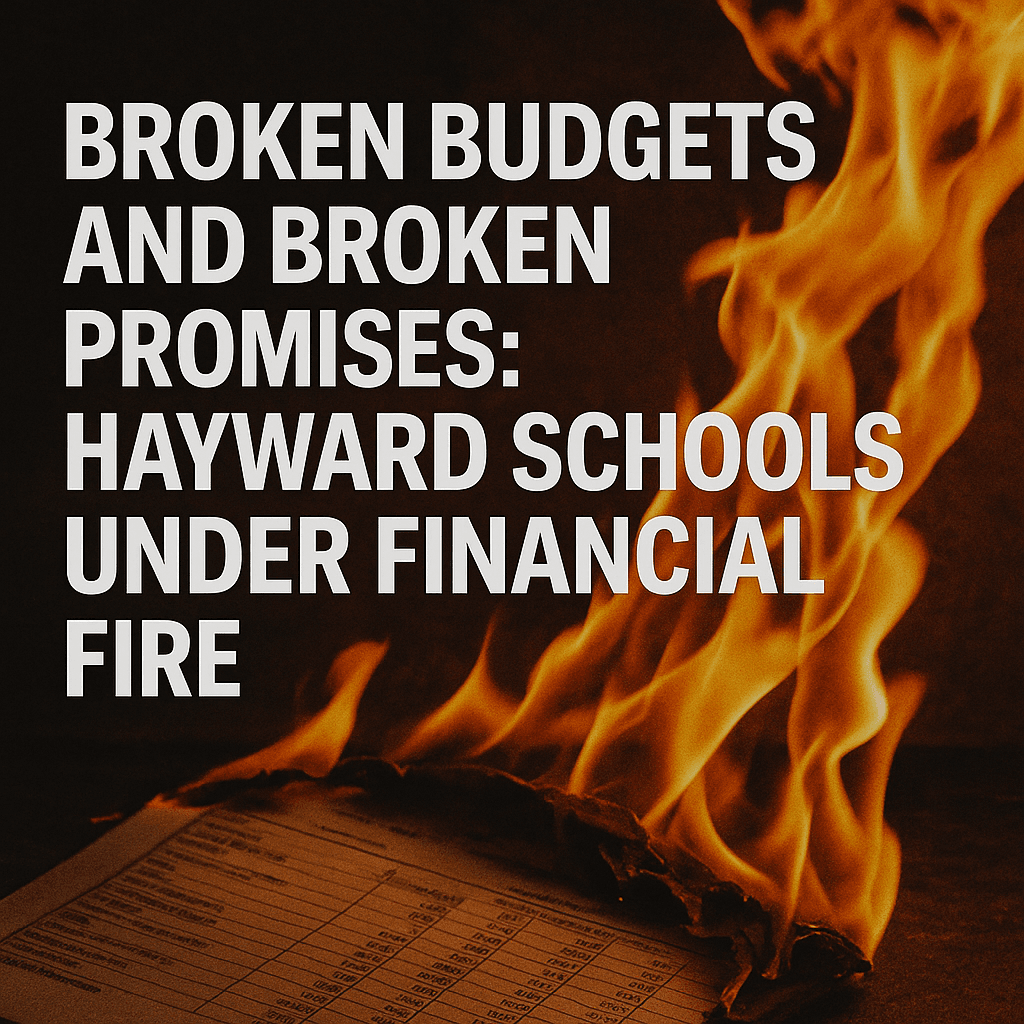Broken Budgets and Broken Promises: Hayward Schools Under Financial Fire

An investigative report into HUSD’s fiscal mismanagement, administrative bloat, and the looming budget crisis threatening student services
By Tom Wong, Independent Investigative Reporter
July 7, 2025
The financial house of cards at Hayward Unified School District is finally collapsing, and taxpayers are about to pay the price for years of reckless spending and administrative incompetence. Despite managing a budget approaching half a billion dollars annually, HUSD continues deficit spending while promising vague “budget solutions” that never materialize.
My investigation into HUSD’s financial records reveals a disturbing pattern: soaring administrative costs, dependency on temporary funding for permanent positions, and a complete lack of accountability from board members who rubber-stamp spending while schools deteriorate and student achievement stagnates.
The Deficit Spending Addiction
HUSD’s own budget documents contain a stunning admission buried in bureaucratic language. During the June 25, 2025 budget adoption meeting, administrators acknowledged “we are continuing to deficit spend” while funding “positions with one-time revenues that are due to expire this upcoming year.”
This isn’t temporary belt-tightening during tough times — it’s systematic fiscal irresponsibility that has become HUSD’s standard operating procedure. The district promises to return with “budget solutions” in September 2025, then spending reduction recommendations in February 2026. Translation: keep spending recklessly until the money runs out, then panic.
The numbers tell the story of institutional failure:
HUSD Monthly Expenditures (May 2025):
- Total spending: $37,368,365.52
- Annualized rate: Approximately $448 million
- Per-student spending: ~$26,000 (17,300 students)
- Administrative overhead: Undisclosed but substantial
The Administrative Gravy Train
While promising future cuts to balance budgets, HUSD had no problem approving lucrative new administrative positions. The June 2025 board meeting included approval for a new Assistant Superintendent of Student and Family Services contract running through June 2027.
Let’s examine the compensation reality for HUSD’s executive class:
Superintendent Chien Wu-Fernandez:
- Estimated base salary: $275,000
- Benefits (35% of salary): $96,250
- Total annual compensation: $371,250
- Hourly rate: $178
- Cost per household: $8.42 (44,000 households)
Assistant Superintendent Positions (Multiple):
- Estimated base salary: $225,000
- Benefits: $78,750
- Total annual compensation: $303,750
- Hourly rate: $146
Board President Peter Bufete and Board Members:
- Annual stipends: Undisclosed but likely $20,000+
- Meeting attendance fees: Additional compensation
- Benefits: Health insurance and retirement contributions
Compare these figures to Hayward’s median household income of approximately $85,000. HUSD executives earn 3-4 times what typical families make while running the district into financial ruin.
The COVID Relief Fund Shell Game
HUSD received substantial federal COVID relief funding that was supposed to address pandemic-related educational challenges. Instead, these temporary funds became a slush fund for expanding permanent administrative positions and contractor agreements.
The district used one-time federal money to:
- Hire additional administrative staff
- Expand consultant contracts
- Fund programs that should have been temporary
- Avoid making difficult budget decisions
Now that COVID funds are expiring, HUSD faces the predictable crisis: how to fund permanent positions with temporary money. Their solution? Keep spending and hope taxpayers don’t notice.
The LCFF Allocation Mismanagement
California’s Local Control Funding Formula (LCFF) provides substantial additional funding for districts serving high-need students. HUSD receives millions in supplemental and concentration grants specifically intended for educational services.
Instead of directing these funds to classroom instruction, HUSD has created an administrative apparatus to manage the money:
- LCAP coordinators and consultants
- Data analysis contractors
- Professional development specialists
- Community engagement facilitators
The May 2025 spending report shows LCFF funds supporting contractor agreements totaling hundreds of thousands of dollars — money that should reach students directly but instead feeds the consultant industrial complex.
Board Meeting Highlights: Rubber Stamps and Silence
My review of recent HUSD board meetings reveals a disturbing pattern of fiscal irresponsibility disguised as routine governance:
June 11, 2025 Meeting:
- Approved $9+ million in special education contractor agreements as “consent items”
- No discussion of why these positions can’t be filled internally
- Superintendent Wu-Fernandez presented no accountability measures for contractor dependency
June 25, 2025 Meeting:
- Adopted 2025-2026 budget with continued deficit spending
- Approved additional contractor agreements exceeding $500,000
- Board members asked no substantive questions about fiscal sustainability
May 28, 2025 Meeting:
- Approved facilities contracts totaling over $200,000
- No competitive bidding discussion for routine maintenance work
- Change orders approved without explanation for cost overruns
Board President Peter Bufete and his colleagues treat taxpayer money like monopoly currency, approving massive expenditures without demanding explanations or accountability from staff.
Community Concerns: Taxpayers Demand Answers
Public comment periods at board meetings reveal growing taxpayer frustration with HUSD’s fiscal mismanagement, though the district limits community input to brief time slots while dedicating hours to administrative presentations.
Common Community Concerns:
- Why can’t HUSD balance its budget like other districts?
- Where is the money from previous tax increases and bond measures?
- Why does the district need so many administrators and consultants?
- When will classroom instruction be prioritized over administrative overhead?
The district’s response? More consultant studies, additional committee meetings, and promises to “return with recommendations” at future meetings. Meanwhile, spending continues unabated.
Union Responses: Protecting Jobs Over Fiscal Responsibility
HUSD’s fiscal crisis is enabled by labor unions that prioritize job protection over sustainable budgets. The district’s Systematic Instructional Review implementation includes “active engagement with all labor unions to ensure shared ownership” of improvement efforts.
Union Positions on Budget Issues:
- Hayward Education Association (HEA): Opposes any cuts to teaching positions while supporting administrative expansion
- Service Employees International Union (SEIU): Protects classified staff positions regardless of fiscal impact
- Association of Educational Office and Technical Employees (AEOTE): Advocates for continued growth in support positions
Rather than acknowledging fiscal reality, union leaders demand that HUSD find additional revenue sources — meaning higher taxes for residents already struggling with California’s cost of living.
The Contractor Dependency Crisis
HUSD’s budget crisis is exacerbated by systematic outsourcing of basic functions that other districts handle internally:
Special Education Contractors (2025-2026):
- Total contracts: Over $9 million annually
- Services that should be provided by district staff
- No accountability measures for contractor performance
Facilities and Maintenance Contractors:
- Annual contracts exceeding $500,000
- Routine maintenance outsourced while employing facilities administrators
- No competitive bidding for many agreements
Professional Services and Consultants:
- Hundreds of thousands in annual contracts
- Basic administrative functions outsourced to expensive consultants
- No metrics for consultant effectiveness
The Bond Measure Bait and Switch
While claiming budget constraints for operations, HUSD successfully convinced voters to approve Measure I’s $550 million bond authorization in March 2024. The first $60 million issuance was completed in April 2025, with taxpayers on the hook for decades of debt service.
Bond Proceeds Usage:
- Consultant fees for environmental studies: $18,034 for single property review
- Administrative overhead for bond management
- Contractor agreements that should be competitively bid
- Change orders and cost overruns on routine projects
Taxpayers approved bonds for classroom improvements but are funding administrative bloat and consultant fees instead.
The Maintenance Assessment District Money Grab
Despite budget crises, HUSD continues extracting money from property owners through the Maintenance Assessment District (MAD), generating $1,368,696 annually at $28.00 per household.
This assessment, approved by barely 51% of voters in 1997, continues indefinitely while the district claims insufficient resources for basic operations. Homeowners pay extra taxes for school maintenance while HUSD outsources the work to expensive contractors.
The Transparency Crisis
HUSD’s financial mismanagement is enabled by deliberate opacity in budget reporting and public disclosure:
Information Gaps:
- Exact administrative salaries and benefits not publicly disclosed
- Contractor performance metrics unavailable
- Long-term fiscal projections absent from public documents
- Board members receive information not shared with taxpayers
When citizens request detailed budget information, they receive bureaucratic runarounds and incomplete data that makes independent analysis nearly impossible.
Comparative Analysis: Other Districts Do Better
Nearby school districts with similar demographics and challenges manage to balance budgets without the contractor dependency and administrative bloat plaguing HUSD:
Dublin Unified School District:
- Balanced budgets without deficit spending
- Lower administrative overhead per student
- Competitive procurement processes
- Transparent financial reporting
San Lorenzo Unified School District:
- Sustainable fiscal practices
- Internal capacity for basic functions
- Accountable board oversight
- Community engagement in budget development
The difference isn’t resources or student needs — it’s management competence and fiscal discipline.
The Real Cost to Families
HUSD’s fiscal irresponsibility translates into real costs for Hayward families already struggling with California’s crushing cost of living:
Annual Household Impact:
- Property taxes supporting deficit spending: $500+ per household
- Maintenance assessments: $28 per household
- Bond debt service: $200+ per household annually for 30 years
- Opportunity cost of misallocated resources: Immeasurable
Every dollar wasted on administrative bloat and consultant fees is a dollar not invested in classroom instruction, student support services, or facility improvements that directly benefit children.
Looking Ahead: The September Reckoning
HUSD administrators promise to return in September 2025 with “budget solutions” to address continued deficit spending. Based on their track record, taxpayers should expect:
- Demands for additional tax increases
- Cuts to classroom services while protecting administrative positions
- More consultant studies and committee meetings
- Blame directed at state funding formulas rather than internal mismanagement
The February 2026 “spending reduction recommendations” will likely target student services while preserving the administrative apparatus that created the crisis.
What Taxpayers Can Demand
Before HUSD returns with their latest budget schemes, taxpayers should demand:
- Complete salary and benefit disclosure for all administrative positions
- Independent fiscal audit of all expenditures since 2020
- Elimination of non-essential administrative positions starting immediately
- Competitive bidding requirements for all contractor agreements
- Public accountability sessions where administrators explain their failures
- Binding commitments to end deficit spending within two years
The Bottom Line
HUSD’s financial crisis isn’t the result of insufficient funding — it’s the predictable outcome of years of fiscal recklessness, administrative bloat, and complete lack of accountability from board members who treat taxpayer money like a personal slush fund.
Superintendent Wu-Fernandez and her administrative team have created a system where failure is rewarded with more resources, contractors profit from district incompetence, and students suffer while adults prosper.
The September budget “solutions” meeting will test whether HUSD’s board has any backbone left to hold administrators accountable. Based on their track record of rubber-stamping spending while offering empty platitudes about “serving students,” taxpayers shouldn’t hold their breath.
Until HUSD replaces failed leadership with competent administrators focused on fiscal responsibility rather than administrative empire-building, the budget crisis will continue. The question isn’t whether this house of cards will collapse — it’s whether taxpayers will demand accountability before it’s too late.
Hayward families deserve a school district that can perform basic functions like balancing a budget without mortgaging their children’s future. They deserve transparency, accountability, and leadership that prioritizes student success over administrative comfort.
HUSD’s broken budgets and broken promises have gone on long enough. It’s time for taxpayers to demand better before this fiscal disaster becomes irreversible.
Tom Wong is an independent investigative reporter and conservative watchdog covering government accountability in the Bay Area. He can be reached at tom.wong.reporter@protonmail.com.
Sources: HUSD 06_11_25 Board of Education Meeting.pdf, HUSD 06_25_25 Board of Education Meeting.pdf, Project info and instructions













